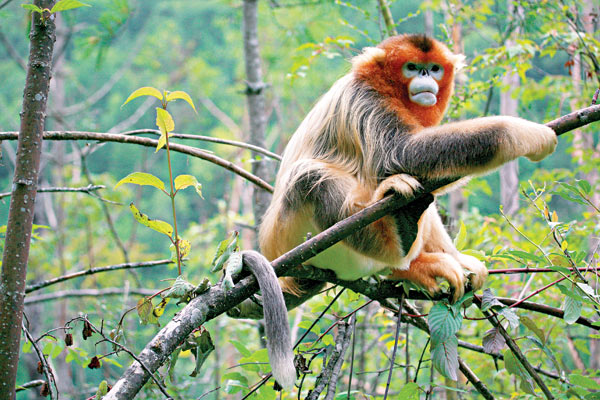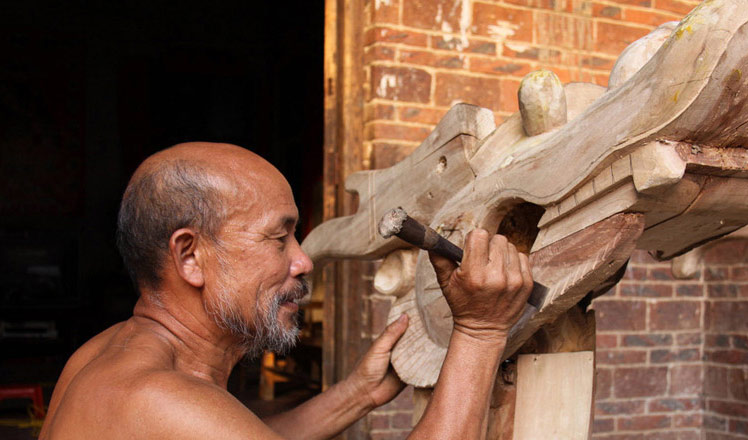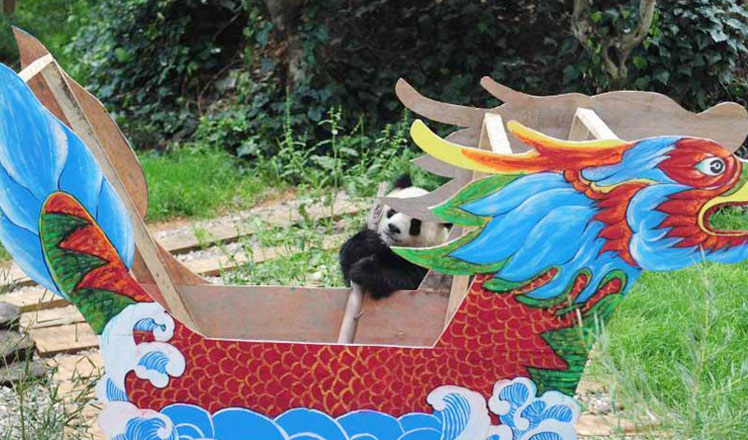The golden creatures of Shennongjia
Updated: 2016-06-11 02:32
By Liu Kun,Liu Xiangrui(China Daily)
|
||||||||
 |
|
Shennongjia Nature Reserve has been one of the most important habitats for golden snub-nosed monkeys, a rare primate living exclusively in China. |
Years of close interaction with the monkeys has given
Huang and his colleagues an intimate knowledge of their charges' habits and traits. Each of the monkeys even has a name.
When Huang talks about the monkeys' lives he comes across as a proud parent talking about his offspring. That includes lovingly describing how one of the monkeys was born and recounting how a new male adult challenged and defeated an older male for supremacy in the group.
"I'm with the monkeys almost every day," Huang says. "We are very close now, and if I had to take a leave I would miss them so much."
Shennongjia, with mountains, thick forests and abundant rainfall that nurture diverse foods for animals, is an important habitat for the golden snub-nosed monkeys. Wild snub-nosed monkeys were first spotted there in the 1980s.
In 2005, the research center Huang works in was founded in Dalongtan, which is 2,300 meters above sea level and one of the natural habitats for the species.
The researchers selected a typical group of the monkeys that lived in a surrounding area of 8 square kilometers for long-term tracking and research.
The researchers track and observe the snub-nosed monkey population, and collect their feces and fur for research.
Huang says that at first life with the monkeys was dull, but he slowly acclimatized to the point where he could feel at one with them.
"The most important quality for working here is being able to withstand hardships."
These include severely cold weather and snow-blanketed roads in winter and mosquitoes and snakes in summer. In summer, the researchers often wake up at 4 am to track monkeys in the wild and do not return to their base until 8 pm.
In the early years, before the advent of electronic tagging, they would pack camping equipment and food, and sometimes remain in the wild for weeks on end doing tracking work.
"Often as the monkeys were jumping from tree branch to tree branch we would be scrambling along on the ground trying to keep up," Huang says. "No matter what the weather was we would be out there looking for them, and the monkeys have scratched almost all of us at some time or other."
One of the greatest challenges for the monkeys is the harsh climate, winter lasting as long as six months and temperatures dropping to -20 C. Some young, weak individuals have died of starvation and the cold.
- Suspected IS terrorists arrested in Germany
- Japanese boy abandoned by parents in Hokkaido forest found alive
- China to build Africa's biggest university library
- 'Kill list' found in UCLA campus shooter's residence: Police
- Swiss declare Alps tamed as Gotthard rail tunnel opens
- China urges Japan to properly settle Chinese forced laborers issue

 Shanghai Disneyland all set for official opening on Thursday
Shanghai Disneyland all set for official opening on Thursday
 British pageantry on parade for Queen's official birthday
British pageantry on parade for Queen's official birthday
 Carrying bricks to selling carrots: Life of child laborers
Carrying bricks to selling carrots: Life of child laborers
 Graduate revisits same university spot 19 years later
Graduate revisits same university spot 19 years later
 Euro powers land in France for UEFA EURO 2016
Euro powers land in France for UEFA EURO 2016
 The most unusualgaokao candidates in 2016
The most unusualgaokao candidates in 2016
 Elderly man carries on 1000-year old dragon boat craft
Elderly man carries on 1000-year old dragon boat craft
 Row your dragon boat, cute pandas in Yunnan!
Row your dragon boat, cute pandas in Yunnan!
Most Viewed
Editor's Picks

|

|

|

|

|

|
Today's Top News
Abe's blame game reveals his policies failing to get results
Ending wildlife trafficking must be policy priority in Asia
Effects of supply-side reform take time to be seen
Chinese State Councilor Yang Jiechi to meet Kerry
Chinese stocks surge on back of MSCI rumors
Liang avoids jail in shooting death
China's finance minister addresses ratings downgrade
Duke alumni visit Chinese Embassy
US Weekly

|

|







